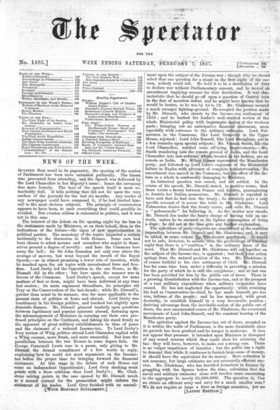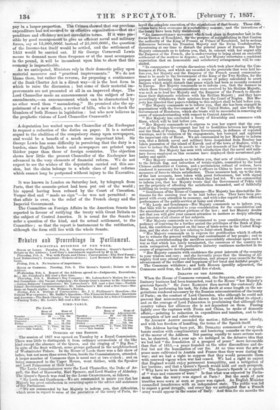NEWS OF THE WEEK.
QUIETER than usual in its pageantry, the opening of the session of Parliament has been more animated politically. The Queen was prevented from attending, and the Speech was delivered by the Lord Chancellor in her Majesty's name ; hence the ceremony was more homely. The text of the speech itself is most remarkably dull. It tells nothing that did not lieupon the very surface of the journals for the last six months. Any reader of any newspaper could have composed it, if he had limited himself to the most obvious subjects. The principle of construction appears to have been, to omit everything that could possibly be avoided. But evasion seldom is successful in politics, and it was not in this case.
The interest of the debate on the opening night lay far less in the statements made by Ministers, or on their behalf, than in the indications of the future—the signs of new approximation in political parties. The monotony of the topics imparted a certain uniformity to the discussion in both Houses. Some care had been chosen to select movers and seconders who might in themselves present a degree of novelty : and here the Commons bore away the bell ; for Sir John Ramsden not only rose above the average of movers, but went beyond the record of the Royal Speech,—as in almost promising a lower rate of taxation, while he touched upon the set topics with unrestrained force and freedom. Lord Derby led the Opposition in the one House, as Mr. Disraeli did in the ether; but here again the manner was in favour of the Commons. Lord Derby's speech, except for some matters of fact or form, might have been delivered at any time last session ; its main argument threadbare, its principles old Tory or the Conservatism of the last decade ; while Mr. Disraeli's, quieter than usual in its manner, was far more applicable to the present state of politics at home and abroad. Lord Derby was reactionary in his foreign politics, and touched but slightly upon domestic finance. Mr. Disraeli glanced tenderly upon questions between legitimacy and popular interests abroad, fastening upon the mismanagement of Ministers in carrying out their own professed principles on the Continent, and taking his stand firmly as the opponent of great military establishments in time of peace and the claimant of a reduced Ineome-tax. To Lord Derby's Tory review of Whig politics abroad Lord Clarendon replied with
a W big resume, more frank, and more successful. But here the parallelism between the two Houses in some degree fails. Sir George Cornewall Lewis rose in a pause, only giving to Mr. Disraeli the formal compliment of a few words in reply, explaining how he could not meet arguments on the Incometax before the proper time for bringing forward the financial statement. At this stage in the debate of each House out came an independent Oppositionist ; Lord Grey slashing weak points with a freer criticism than Lord Derby's ; Mr. Gladstone seizing points in the case opened by Mr. Disraeli much as a second counsel for the prosecution might enforce the statement of his leader. Lord Grey finished with an amend ment upon the subject of the Persian war ; though why lie should ,
select that one question for a stand on the first night of the ses
sion, nobody could tell. He held it to be a dereliction of duty to declare war without Parliamentary consent, and ho moved an amendment implying censure for that dereliction. It was characteristic that he should go off upon a question of Central Asia in the face of manifest defeat, and he might have known that he would he beaten, as he was by 45 to 12. Mr. Gladstone secured a much stronger fighting-ground. He accepted the position made by Mr. Disraeli, who stands by the Income-tax settlement of
1853; and he backed his leader's well-studied review of the
whole Ministerial policy with impromptu dashes at the weakest parts ; bringing out an anticipative financial statement, more especially with reference to the military estimates. Lord Palmerston in the Commons like Lord Granville in the Upper House, rejoined ; Lord John Russell, like Lord Brougham put in a few remarks upon special subjects ; Mr. Vernon Smith, like the Lord Chancellor, notified some off-lying improvements,—Mr. Smith wandering into the remote ground of India, and the Lord Chancellor into law-reforms; whichtreated in his fashion, are as remote as India. Mr. Milner Gibson represented the Manchester party, and followed up Lord John's exposure of the Ministerial failure in Naples with advocacy of complete nonintervention. No amendment was moved in the Commons, but the effect of the debate as a whole is confessedly damaging to Ministers.
An historical question was raised, and not settled. In the
course of his speech, Mr. Disraeli stated, in positive terms, that there exists a treaty between France and Austria, guaranteeing to Austria her Italian possessions. Mr. Disraeli is reported to have said that he had seen the treaty ; he certainly gave a very specific account of it across the table to Mr. Gladstone. Lord Palmerston denies that the treaty exists, and calls Mr. Disraeli a " gobemouche " for believing it. As the matter now stands, Mr. Disraeli lies under the heavy charge of having told an untruth, unless he be excused on the lighter p sumption of being further a dupe : he did not at the time give any f er explanation.
The upholders of party etiquette are Rand *zed at the coalition
impending between Mr. Disraeli and Mr. Gladstone, and, it may be added, to some extent gite_Mttrichester gentlemen. It weidd not be safe, however, to assuilie'fibin the pro8eedings of Tuesday night that there is a " coalition " in the ordinary sense of tho word. That Mr. Disraeli and Mr. Gladstone will act together on the subject of the Income-tax, is apparent ; but their joint action springs from the natural position of the two. Mr. VIdadstone is of course faithful to his own settlement of 1853. Mr. Disraeli has for some time been under a difficulty in providing a mission for the party of which he is still the coryphteus ; and at last one has been provided for him by the public out of doors. There is a growing dissatisfaction with the Income-tax, and at the prospect of a vast military expenditure when military exigencies have ceased. He has not neglected the opportunity : while retaining his lead as Conservative-in-chief, he has made himself, pro hao vice, tribune of the people ; and he has managed, with great dexterity, to establish himself in a very favourable position ; deriving advantage from the inevitable action of the public out of doors, the now unconcealed course of Mr. Gladstone, the occasional movements of Lord John Russell, and the constant bearing of the Manchester party.
The agitation against the Income-tax out of doors, accepted as it is within the walls of Parliament, is the more formidable since its growth has been gradual and its temper is moderate. It does not appear that pressure is intended upon Ministers in disregard of any sound reasons which they could show for retaining the tax : they will have, however, to make out a strong case. There is no vulgar impatience of taxation ; but the public has a right to demand that while it continues to furnish large sums of money, it should have the equivalent for its money. More reduction is not economy, but large estimates are not necessarily efficient service. Mr. Gladstone who has horrified formalists in finance by grappling with the figures before the time calculates that the naval and military estimates alone will involve sums amounting in the aggregate to nearly 25,000,0001. The question is, Can we obtain an efficient army and navy for a much smaller sum 14 We do not require so large a force as foreign countries, yet we pay in a larger proportion. The Crimea showed that our previous expenditure had not secured to us effective organization—that expenditure and efficiency are not correlative terms. If it were possible by good management to give us efficient naval and military forces, say at 15,000,0001. instead of 25,000,0001., the question of the Income-tax itself would be settled, and the settlement of 1853 would be carried out. If Sir George Cornewall Lewis means to demand more than fivepenee or at the most sevenpence in the pound, it will be incumbent upon him to show that this economy is impracticable.
Is we anticipated, Ministers rely in their domestic policy upon material measures and "practical improvements." We do not blame them, but rather the reverse, for proposing a continuance of the Bank Charter Act in a direct way—it is the best form in which to raise the discussion ; but some of their material improvements are not presented at all in an improved shape. The Lord Chancellor made an announcement on the subject of lawamendments,—an announcement which can be characterized by no other word than "maundering." He promised also the appointment of a new officer, a reviser of bills, who is to cheek the blunders of both Houses in legislation : but who now believes in the prophetic visions of Lord Chancellor Cranworth ?
A deputation has waited upon the Chancellor of the Exchequer to request a reduction of the duties on paper. It is a natural sequel to the abolition of the compulsory stamp upon newspapers, and would be a benefit of a much more important kind. Sir George Lewis has some difficulty in perceiving that the duty is a burden, since English books and newspapers are printed upon thicker paper than those of foreign countries. The objection shows how little the present Chancellor of the Exchequer has advanced in the very elements of financial reform. We do not expect to see the wishes of the deputation carried out this session, but the claim belongs to a whole class of fiscal reforms which cannot long be postponed without injury to the Executive.
It was known in London on Saturday last, by telegraph from Paris, that the assassin-priest had been put out of the world ; his appeal having been refused by the Court of Cessation. Verger died and "made no sign "—he was not permitted : so that affair is over, to the relief of the French clergy and the Imperial Government.
The Committee on Foreign Affairs in the American Senate has reported in favour of ratifying the treaty with Great Britain on the subject of Central America. It is usual for the Senate to refer a question of the kind, and its actual settlement, to the Committee ; so that the report is tantamount to the ratification, although the form still lies with the whole Senate.



































 Previous page
Previous page